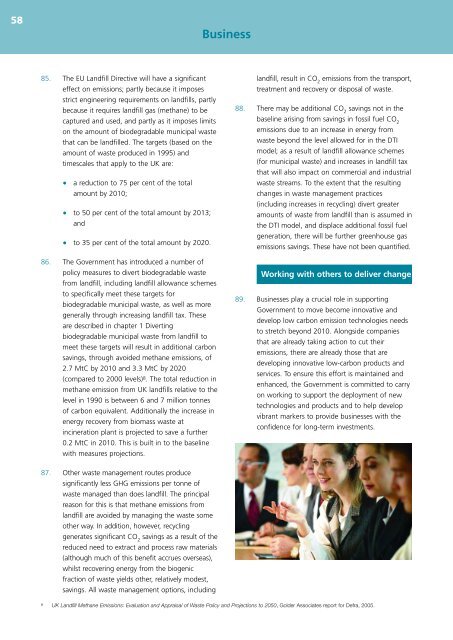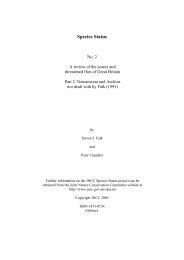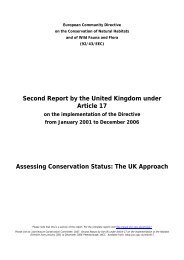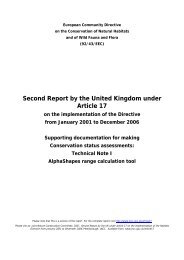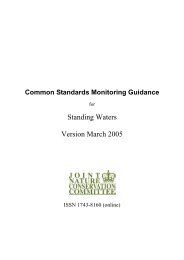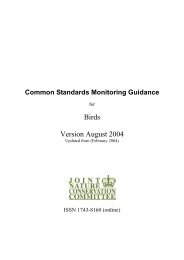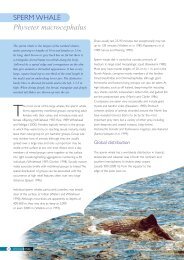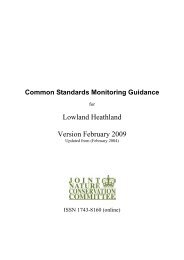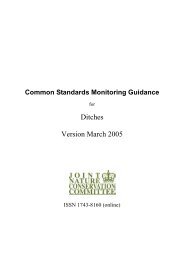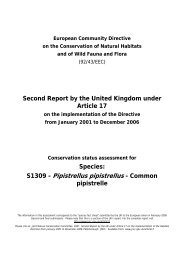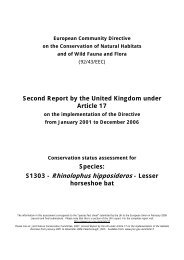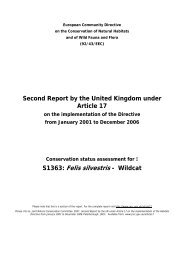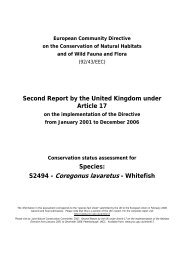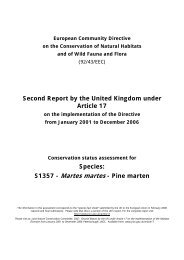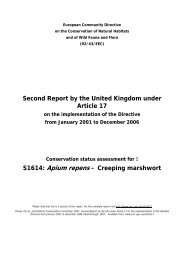UK Climate Change Programme 2006 - JNCC - Defra
UK Climate Change Programme 2006 - JNCC - Defra
UK Climate Change Programme 2006 - JNCC - Defra
Create successful ePaper yourself
Turn your PDF publications into a flip-book with our unique Google optimized e-Paper software.
58<br />
Business<br />
85. The EU Landfill Directive will have a significant<br />
effect on emissions; partly because it imposes<br />
strict engineering requirements on landfills, partly<br />
because it requires landfill gas (methane) to be<br />
captured and used, and partly as it imposes limits<br />
on the amount of biodegradable municipal waste<br />
that can be landfilled. The targets (based on the<br />
amount of waste produced in 1995) and<br />
timescales that apply to the <strong>UK</strong> are:<br />
• a reduction to 75 per cent of the total<br />
amount by 2010;<br />
• to 50 per cent of the total amount by 2013;<br />
and<br />
• to 35 per cent of the total amount by 2020.<br />
86. The Government has introduced a number of<br />
policy measures to divert biodegradable waste<br />
from landfill, including landfill allowance schemes<br />
to specifically meet these targets for<br />
biodegradable municipal waste, as well as more<br />
generally through increasing landfill tax. These<br />
are described in chapter 1 Diverting<br />
biodegradable municipal waste from landfill to<br />
meet these targets will result in additional carbon<br />
savings, through avoided methane emissions, of<br />
2.7 MtC by 2010 and 3.3 MtC by 2020<br />
(compared to 2000 levels) 8 . The total reduction in<br />
methane emission from <strong>UK</strong> landfills relative to the<br />
level in 1990 is between 6 and 7 million tonnes<br />
of carbon equivalent. Additionally the increase in<br />
energy recovery from biomass waste at<br />
incineration plant is projected to save a further<br />
0.2 MtC in 2010. This is built in to the baseline<br />
with measures projections.<br />
landfill, result in CO 2<br />
emissions from the transport,<br />
treatment and recovery or disposal of waste.<br />
88. There may be additional CO 2<br />
savings not in the<br />
baseline arising from savings in fossil fuel CO 2<br />
emissions due to an increase in energy from<br />
waste beyond the level allowed for in the DTI<br />
model; as a result of landfill allowance schemes<br />
(for municipal waste) and increases in landfill tax<br />
that will also impact on commercial and industrial<br />
waste streams. To the extent that the resulting<br />
changes in waste management practices<br />
(including increases in recycling) divert greater<br />
amounts of waste from landfill than is assumed in<br />
the DTI model, and displace additional fossil fuel<br />
generation, there will be further greenhouse gas<br />
emissions savings. These have not been quantified.<br />
Working with others to deliver change<br />
89. Businesses play a crucial role in supporting<br />
Government to move become innovative and<br />
develop low carbon emission technologies needs<br />
to stretch beyond 2010. Alongside companies<br />
that are already taking action to cut their<br />
emissions, there are already those that are<br />
developing innovative low-carbon products and<br />
services. To ensure this effort is maintained and<br />
enhanced, the Government is committed to carry<br />
on working to support the deployment of new<br />
technologies and products and to help develop<br />
vibrant markers to provide businesses with the<br />
confidence for long-term investments.<br />
87. Other waste management routes produce<br />
significantly less GHG emissions per tonne of<br />
waste managed than does landfill. The principal<br />
reason for this is that methane emissions from<br />
landfill are avoided by managing the waste some<br />
other way. In addition, however, recycling<br />
generates significant CO 2<br />
savings as a result of the<br />
reduced need to extract and process raw materials<br />
(although much of this benefit accrues overseas),<br />
whilst recovering energy from the biogenic<br />
fraction of waste yields other, relatively modest,<br />
savings. All waste management options, including<br />
8 <strong>UK</strong> Landfill Methane Emissions: Evaluation and Appraisal of Waste Policy and Projections to 2050, Golder Associates report for <strong>Defra</strong>, 2005.


